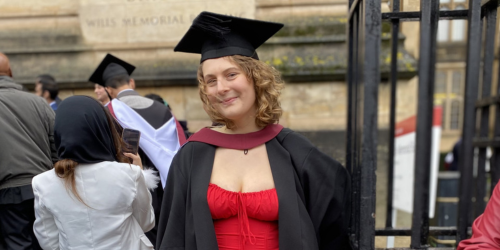Understanding plankton ecology
Heather Cripps' MScR project is on 'Revealing coccolithophore functional groups via trait-based statistics'. Read more about her story below.
There‘s no such thing as the ‘right’ background
My background is in human geography and English literature, but I’ve always had an interest in marine conservation. When I was at COP26 I was introduced to a lot of indigenous communities that were raising awareness of sea level rise and its impacts on indigenous cultures, and I wanted to learn more.
A friend told me about the MScR programme at Bristol, so I had a look at the available projects and found one on phytoplankton. Now, I knew with my background that I wasn’t going to be able to just walk into any master's programme, so I got in touch with the project supervisor, introduced myself and explained how I didn’t have any of the hard skills required, but was really interested in learning them. My supervisor and I really clicked, and so I was invited to join the programme.
My research project
My project explores new ways to assess and understand plankton species. There’s been a lot of work done around trait-based methods in plants, so I’ve been looking at ways to apply those methods to plankton. I’ve been using machine learning methods to understand the relationship between different traits, such as their body size and energy expenditure.
In particular, I’ve been focused on coccolithophores, as they are a relatively under-researched group of Plankton. We can’t really culture them – and they’re microscopic – so we don’t have a big understanding of them. I’ve been exploring similarities between them and other species, and also understanding what will happen to them as global warming drives ocean acidification.
What’s next
I’ve been fortunate to get some funding to pursue a PhD in Australia. I’ll be working with a team that studies extreme heat wave predictions, and studying the social and ecological impacts of extreme heat events on indigenous cultures. My MScR has given me the skills in data science and modelling, but for me the most important part is bringing those indigenous voices to the research. I don’t have a thesis title yet, but there are a lot of options. I’m definitely excited to go, but I think I’ll end up coming back to Bristol eventually – I really like it here.
Owning discomfort
I know how daunting it can be to consider a programme like the MScR. I didn’t have a data science background and at the start I was definitely out of my comfort zone. But that’s how you really learn, and it’s so motivating.
For me, the independent nature of the programme really appealed. You don’t have to be continually working towards the right grades to stay afloat; you do things your way on your own schedule. That being said, I never felt alone – there’s always something going on and I’d definitely recommend finding a research group, as that can be very validating when you’re feeling out of your depth. There will always be communities within your subject area. People say research is really lonely but I just don’t believe them!
 Inspired by Heather's story?
Inspired by Heather's story?
Connect with Heather on LinkedIn.
Supervisors
Supervised by Dr Fanny Monteiro and Dr Levi Wolf.
Get in touch with the Cabot PGR team
Have a question about your prospective application? We'd love to hear from you. Email us on cabot-masters@bristol.ac.uk.